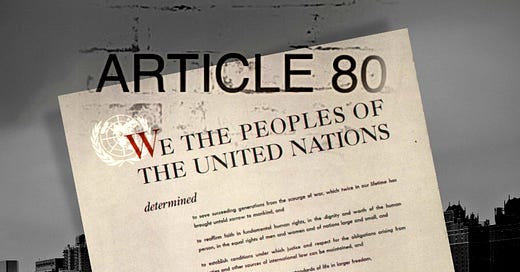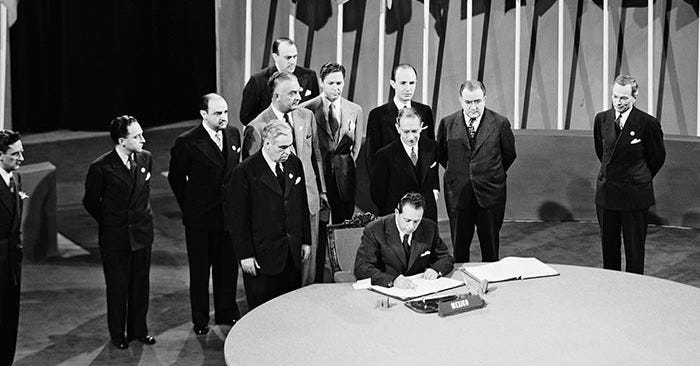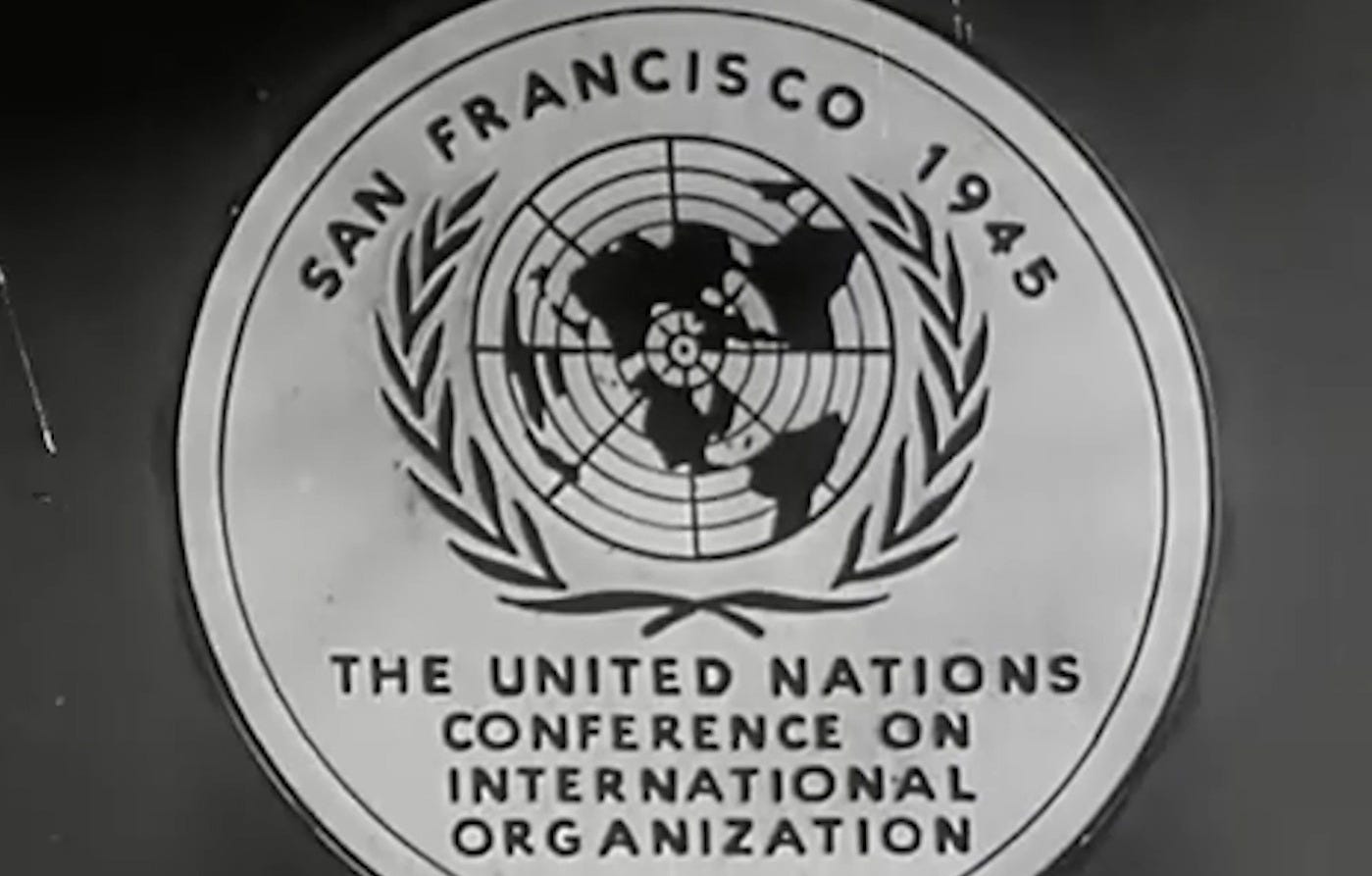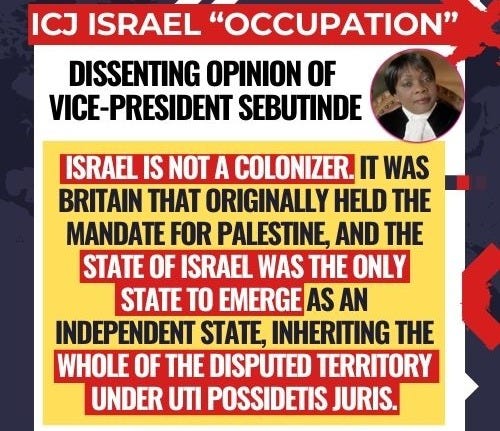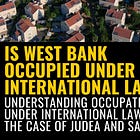The United Nations Charter and the Sacred Mandate: A Legal Obligation Ignored
Article 80: "the Palestine Article” or "Jewish People’s Clause"
On December 31, 1945, Poland ratified the United Nations (UN) Charter, finalizing its establishment and marking the start of a new international order. The Charter, signed on June 26, 1945, at the San Francisco Conference, came into effect on October 24, 1945, aiming to promote peace and prevent future atrocities like the Holocaust. Within this framework, provisions were made to secure the rights of millions of Jewish people.
The San Francisco Conference and Article 80:
A key but often overlooked section of the UN Charter is Article 80, known as the "Palestine Article" or "Jewish People’s Clause," which impacts Jewish rights in Israel under international law. The UN, formed after the dissolution of the League of Nations, preserved the legal frameworks of the League, including the Jewish right to settle and establish a homeland in Palestine under the British Mandate. Article 80 ensured this right remained intact after the League's dissolution
The League of Nations had endorsed the British Mandate for Palestine, recognizing the Jewish right to settle and create a homeland there. Article 80, in the UN Charter, ensured legal continuity, preserving this mandate. Jewish leaders played a crucial role in securing Article 80 at the 1945 San Francisco Conference, which preserved the Jewish right to settle throughout Palestine, as guaranteed in the Mandate since 1922.
The San Francisco Conference, held from April 25 to June 26, 1945, was historic not only for creating the UN and the UN Charter, but also for ensuring that Jewish rights were legally recognized on an international stage and survived the end of the League of Nations.
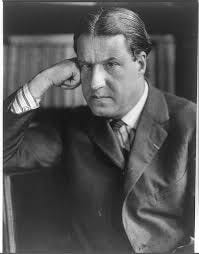


Among the Jewish representatives at the conference were prominent figures such as Rabbi Stephen S. Wise, Peter Bergson, Eliahu Elath, Professor Ben-Zion Netanyahu (father of Israeli Prime Minister Benjamin Netanyahu), and Harry Selden. Their mission was clear: protect the Jewish right of settlement anywhere in Palestine under the Mandate and ensure that the UN Charter would not erode those rights in the future.
Professor Eugene Rostow, a key figure in the formulation of Article 80, explained, "The British Mandate for Palestine was duly recognized by the UN. This measure guaranteed that Jews had the unalterable right to live anywhere in the region between the Jordan River and the Mediterranean Sea." - ‘A trust’ – as in Article 80 of the UN Charter – does not end because the trustee dies. This article explicitly states that nothing in the UN Charter could alter the provisions of the Mandate, guaranteeing that Jews had the right to settle throughout the land.
Article 80
Except as may be agreed upon in individual trusteeship agreements, made under Articles 77, 79, and 81, placing each territory under the trusteeship system, and until such agreements have been concluded, nothing in this Chapter shall be construed in or of itself to alter in any manner the rights whatsoever of any states or any peoples or the terms of existing international instruments to which Members of the United Nations may respectively be parties
The legal significance of Article 80 cannot be overstated. As Eli M. Hertz, an expert on Israel's legal history, writes.
“The Mandate for Palestine, which guaranteed the Jewish right to settle in all of the land between the Jordan River and the Mediterranean Sea, was preserved under the UN system. In this way, Article 80 legally enshrined the Jewish right and protected it from any future political pressures.”
International Court of Justice (ICJ) Rulings on Article 80
The significance of Article 80 has been reaffirmed in several rulings by the International Court of Justice (ICJ). These rulings reinforce the continuity of a Mandate. The ICJ reaffirmed the meaning and validity of Article 80 in three crucial cases:
1950: In the Advisory Opinion on the Legal Consequences of the Continued Presence of South Africa in Namibia, the ICJ affirmed the legitimacy of Article 80 and its continued relevance under international law.
1971: The ICJ again recognized the legal standing of Article 80 in its ruling on the Legal Consequences for States of the Continued Presence of South Africa in Namibia, where the Court emphasized the persistence of international mandates.
2004: The ICJ reaffirmed Article 80 in its opinion on the Legal Consequences of the Construction of a Wall in the Occupied Palestinian Territory, ruling that the rights granted under the Mandate continued to hold legal weight even after the withdrawal of the British.
The Continued Violation of the UN Charter
The continued calls to “dismantle the settlements” and “end the occupation”, euphemisms for ethnic cleansing, in a region where Jews have a clear historical connection and legal rights have clear political agendas to challenge Jewish sovereignty and legitimacy of the only Jewish State in the world.
Article 80, which protects Jewish rights, is key to understanding Israel's legal foundation. It affirms that the Jewish right to settle in Jerusalem, Judea, Samaria, and Gaza was guaranteed by international law, and the UN’s treatment of this issue through resolutions and “advisory opinions” violates the UN Charter itself.
The significance of Article 80 is clear: the Jewish right to Israel is enshrined in international law and the UN Charter. The 1945 San Francisco Conference played a pivotal role in securing these rights, and Article 80 remains a key legal foundation for Jewish sovereignty in Israel. The UN’s failure to uphold this right perpetuates conflict, but Article 80, unlike non-binding UN resolutions, ensures that the Jewish people have the legal right to their homeland.
Additionally, the idea that the UN will state Jews living anywhere in the world, let alone Israel, is “Illegal under international law” is both legally untenable and morally inexcusable. Israel's sovereignty is also grounded in solid international law. The principle of Uti Possidetis juris, which holds that a state's borders at its formation reflect the territory inherited from previous entities, affirms Israel’s legal right to its land. Denying Jews the right to live in their homeland is not just a political disagreement, but a violation of fundamental rights and international law and the UN charter.
“Under international law, neither Jordan nor the Palestinian Arab ‘people’ of Judea, Samaria, East Jerusalem and the Gaza Strip have a claim to the sovereign possession of the territories.”
Arabs were never granted political rights under the Mandate for Palestine, only Jews. The reason for that is because Arab political rights were granted in 4 territories: Iraq, Lebanon, Transjordan (later Jordan), and Syria.

